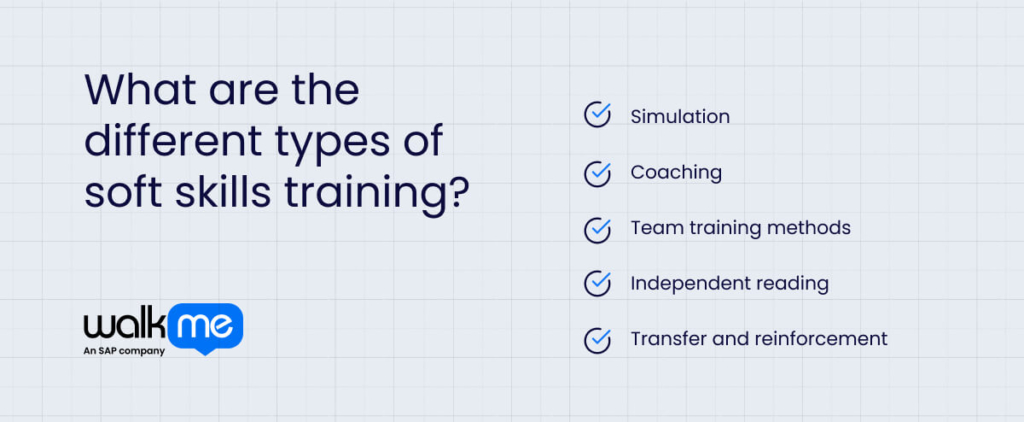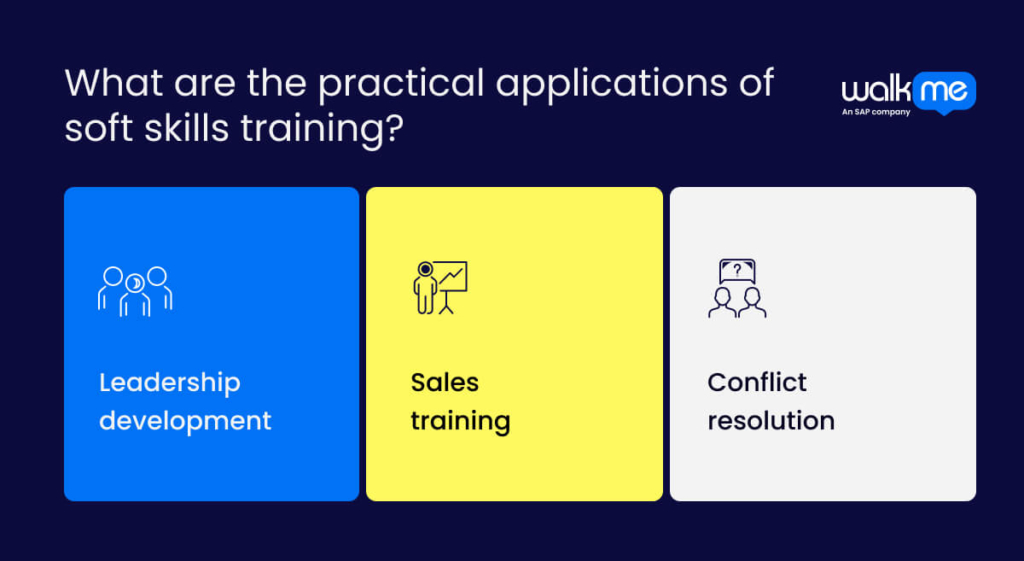Soft skills, the qualities that make us human, are often overlooked in business growth and organizational development plans.
While technical skills like cybersecurity or prompt engineering are important, World Economic Forum research shows that soft skills such as creativity, flexibility, motivation, and curiosity are crucial.
Soft skills training is a type of employee training that helps employees adapt to change, from technological challenges to economic downturns.
This article will explore how organizational soft skills training can address tomorrow’s needs. It will define soft skills training, introduce key training methods, and highlight situations where it is particularly effective.
What is soft skills training?
Soft skills training helps staff develop their transferable talents in various areas.
Soft skills are the personal attributes, characteristics, and interpersonal abilities that enable individuals to effectively interact with others, navigate social situations, and perform tasks in the workplace.
Out of the huge range of soft skills, some of the most important ones today include:
- Effective communication
- Teamwork
- Influencing without authority
- Problem-solving
- Leadership
In the modern workplace, very few jobs do not require effective soft skills. Developing these skills requires specific corporate training approaches.
What are the different types of soft skills training?

This section will introduce the best ways to implement soft skills training in your organization. In corporate training, the best methods of soft skills training should be interactive and participatory, with plenty of opportunities for feedback and evaluation.
However, individual staff members can improve soft skills through gentler education, reflection, and practice.
With these factors in mind, some of the best types of training for soft skills are:
- Simulation
- Coaching
- Team training methods
- Independent reading
- Transfer and reinforcement
Some types of eLearning can also be useful for elements of soft skills training, as discussed elsewhere.
Simulation training
Simulation training helps staff improve their capacity to deal with high-pressure situations. Soft skills are among the important lessons that simulations teach. In a simulation, participants may experience many of the emotional ups and downs they would experience when faced with the reality of the situation.
A good simulation will help staff apply their “hard” skills in an unpredictable environment, but they should also be invited to reflect on the emotional challenges that came with it. Simulations that specifically support soft skills learning in time management, teamwork, communication, and emotional intelligence can be created.
Coaching
Coaching is highly effective for training soft skills, promoting self-awareness, continuous growth, and applying new skills in real-life interactions. It’s particularly beneficial for individuals who struggle to recognize their strengths and weaknesses.
Coaches provide personalized feedback, pinpoint areas for improvement, and guide practical exercises to enhance communication, collaboration, leadership, and emotional intelligence.
Team training methods
Team training methods enhance soft skills by creating an environment where participants can be present, vulnerable, and empathetic. Events like away days and retreats allow staff to interact in a relaxed manner, promoting open communication, collaboration, and relationship-building.
Through team-building activities, group discussions, and shared experiences, participants develop key skills like communication, teamwork, problem-solving, and transformational leadership. The informal atmosphere encourages individuals to step outside their comfort zones, explore new perspectives, and practice interpersonal skills in real-world situations.
Independent reading and reflection
Formal training interventions are not the only way to enhance soft skills. After all, many soft skills develop from a deep place of self-exploration.
As a result, informal reading can be an excellent way for individuals to improve their soft skills.
Training leaders can encourage this with some gentle steps. For example:
- Implementing a CPD library in your organization
- Internally publishing book reviews
- Making reading recommendations
This will help build deeper soft skills, knowledge, and expertise in your organization.
Reinforcement and transfer
Staff retain and develop soft skills most effectively when they actively apply them. A 2018 study by a team of Dutch researchers highlighted this as a key challenge in soft skills training. Without opportunities to use these skills in their roles—known as “transfer”—employees will likely forget what they’ve learned.
As such, a strategic approach to soft skills training will ensure that employees can apply what they have learned. That could be through:
- On-the-job training methods such as job rotation
- Continuous training opportunities, including collaborative training, refresher sessions, and communications from leadership
- Including soft skills development in performance management strategies
Any successful learning intervention follows a forgetting curve, which is particularly evident with soft skills. To combat this, it’s essential to provide employees with continuous opportunities to develop and reinforce their soft skills, ensuring lasting growth and retention.
What are the practical applications of soft skills training?

Soft skills are valuable for all staff. Regardless of the employee’s role or pay grade, soft skills improve professional relationships, promote a positive work culture, and increase productivity and performance across teams and departments.
This section will illustrate the practical value of soft skills training in three key areas. We will look at soft skills in the following ways:
- Leadership development
- Sales training
- Conflict resolution
We will explain the important soft skills and how to implement training strategies to develop them in each area.
Leadership development
Effective leaders require broad, soft skills to excel in their roles. While technical expertise, project management, and financial responsibility are essential, strong, soft skills enable leaders to build consensus, promote teamwork, and enhance employee experiences with empathy and understanding.
The following list indicates some ways soft skills are important for leaders:
- Effective leaders communicate clearly and persuasively, inspiring and guiding their teams through active listening, clear idea articulation, and constructive feedback.
- Emotional intelligence enables leaders to manage emotions, empathize with others, and foster trust, collaboration, and conflict resolution.
- Strong leaders are decisive, can analyze risks, weigh options, and make informed, timely decisions that align with organizational goals.
- Leadership requires navigating change and uncertainty, demanding flexibility, resilience, and openness to new ideas and perspectives.
Very few leaders will have all of these skills naturally. Leadership skill development programs should make a special place to learn such skills.
How to implement it
Leadership soft skills training is one element of a comprehensive leadership development program for most companies. To implement soft skills interventions for leaders, here are some of the most effective methods:
- Role-playing and simulation where participants practice decision-making, conflict resolution, and team management in realistic leadership scenarios within a safe environment.
- Case studies and group discussions that analyze real-world leadership examples and explore different approaches and lessons learned through group conversations.
- Coaching by pairing participants with experienced leaders to receive personalized guidance, feedback, and development plans for enhancing leadership skills.
Implementing these simple methods in a comprehensive leadership program will support much more effective leadership in the future.
Sales training
For any client-facing role, soft skills are vitally important. Customer-centricity is widely claimed as a route to customer success. But if your staff can’t talk to customers properly, all the software tools won’t help you.
This is especially true for the sales team, which guides new customers to make informed and comfortable decisions. Some salespeople are naturally talented takers and won’t need specialist sales transformation training to get results.
However, a good education program for salespeople will make sure they are competent in the following soft skills:
- Effective communication is key for sales professionals to clearly explain the value of products or services, listen to customer needs, and convey information persuasively.
- Building strong customer relationships is essential for success. It requires empathy, active listening, and a deep understanding of their motivations.
- Negotiation skills are critical for closing deals, involving problem-solving, flexibility, and assertiveness to reach mutually beneficial agreements.
As you can see, many soft skills are interconnected. Any targeted skills intervention will have a knock-on effect on other elements of employees’ skill sets.
How to implement it
If you’re trying to support soft skills development in your sales team, consider some of the following approaches:
- Pair new sales hires with experienced mentors or supervisors through shadowing and on-the-job training to provide guidance, demonstrate best practices, and offer real-time feedback during customer interactions.
- Schedule regular one-on-one coaching sessions for sales professionals to review performance, discuss challenges, and set improvement goals, focusing on soft skills development.
- Offer continuous learning and development through eLearning, providing access to online courses, webinars, and resources to enhance negotiation tactics, communication skills, and emotional intelligence.
Remember that soft skills may develop slowly at first. That’s quite alright. Keep offering training, and your sales team will continue to grow in their understanding.
Conflict management
Finally, conflict management training helps workers combine soft skills and tested strategies to diffuse problems in their teams and workplaces.
Some of the key skills a trainee conflict manager will develop include:
- Listen attentively to others’ viewpoints without judgment or interruption, helping to comprehend underlying issues and find mutually agreeable solutions.
- Understand and empathize with the emotions and needs of others involved in the conflict, facilitating empathy-driven responses and cooperative problem-solving.
- Manage emotions and respond calmly and rationally in tense situations to de-escalate conflicts and maintain constructive dialogue.
- Collaborate with conflicting parties to brainstorm solutions, compromise, and reach agreements that address everyone’s interests. This will promote long-term conflict resolution and relationship-building.
How to implement it
Some of the standard ways to implement soft skills training include:
- Conduct role-playing scenarios where participants simulate conflict situations and practice communication, active listening, and empathy skills to resolve conflicts effectively.
- Provide training on mediation techniques and strategies for impartially facilitating discussions, helping conflicting parties explore interests and reach mutually acceptable resolutions.
- Analyze real-life conflict scenarios or case studies as a group, encouraging participants to identify root causes, discuss alternative perspectives, and brainstorm creative solutions.
Does soft skills training make a difference?
Soft skills are essential for success in both work and social settings. While measuring the direct impact of soft skills training can be challenging, it undeniably fosters a more positive organizational culture, boosting retention and job satisfaction.
Research consistently shows that soft skills training improves employee performance, particularly in the short term, as seen in recent studies from Jamaica and Colombia.
Multiple strategies can enhance your employees’ soft skills. This article’s tactics and scenarios provide key elements of effective soft skills training.
FAQs
The seven major soft skills include communication, teamwork, problem-solving, time management, adaptability, leadership, and emotional intelligence. These skills are essential for effective collaboration, decision-making, and handling challenges in the workplace, improving overall employee performance and organizational success.
The 5 C’s of soft skills are communication, collaboration, critical thinking, creativity, and conflict resolution. These competencies help employees interact effectively, solve problems, think innovatively, and manage conflicts, making them crucial for personal and organizational growth.
Use role-playing, workshops, simulations, coaching, and feedback sessions to train soft skills. Encourage active learning through real-world scenarios, group discussions, and peer interactions. Provide continuous learning opportunities and ensure regular practice and reflection to reinforce these skills.

